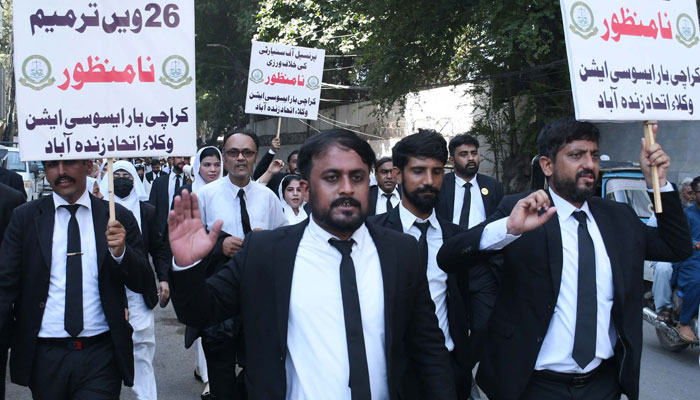Lawyers challenge 26th amendment in SHC
A Sindh Bar Council member and the president of the Malir Bar Association has challenged different sections of 26th Constitutional Amendments in the Sindh High Court.
Petitioner Mohammad Ashraf Sammi and MBA President Nasir Raza submitted that the parliament enacted 26th amendment in the constitution which violates the principles of separation of power, judicial independence and rule of the law.
They said the impugned amendments drastically undermine the authority of the Supreme Court of Pakistan and the high courts by transferring constitutionally vested powers to some new constitutional benches unknown to the basic structure of the constitution.
The petitioners’ counsel Ali Tahir submitted that the amendment contemplates selection of chief justice from a panel of three senior most judges of the SC which is to be done by the special parliamentary committee, which is a clear attack on the independence of the judiciary and an attempt to undermine and control independence of the judges.
The counsel also questioned independence of casting of votes by the members of the parliament and submitted that if the court observed that two members of either house did not freely exercise their right of vote, the 26th amendment will be procedurally invalid and liable to be struck down.
He submitted that the parliament made an amendment in the 175 (A) (2) in which greater interference is allowed by the executive over the appointment of Supreme Court judges and judicial commission shall be composed of CJP, three senior judges of the SC, most senior judge of the constitutional bench, federal minister of law, attorney general of Pakistan, an advocate nominated from Pakistan Bar Council, two members from Senate, two members from National Assembly and a woman or non-Muslim other than a member of Majlis-e-Shoora who is qualified to be member of the Senate as technocrat to be nominated by the speaker National Assembly.
He submitted that an increased non-judicial and political influence/interference in the appointment of judges may lead to compromising judicial independence and is contrary to the principle of trichotomy of powers.
-
 What You Need To Know About Ischemic Stroke
What You Need To Know About Ischemic Stroke -
 Shocking Reason Behind Type 2 Diabetes Revealed By Scientists
Shocking Reason Behind Type 2 Diabetes Revealed By Scientists -
 SpaceX Cleared For NASA Crew-12 Launch After Falcon 9 Review
SpaceX Cleared For NASA Crew-12 Launch After Falcon 9 Review -
 Meghan Markle Gives Old Hollywood Vibes In New Photos At Glitzy Event
Meghan Markle Gives Old Hollywood Vibes In New Photos At Glitzy Event -
 Simple 'finger Test' Unveils Lung Cancer Diagnosis
Simple 'finger Test' Unveils Lung Cancer Diagnosis -
 Groundbreaking Treatment For Sepsis Emerges In New Study
Groundbreaking Treatment For Sepsis Emerges In New Study -
 Roblox Blocked In Egypt Sparks Debate Over Child Safety And Digital Access
Roblox Blocked In Egypt Sparks Debate Over Child Safety And Digital Access -
 Savannah Guthrie Addresses Ransom Demands Made By Her Mother Nancy's Kidnappers
Savannah Guthrie Addresses Ransom Demands Made By Her Mother Nancy's Kidnappers -
 OpenAI Reportedly Working On AI-powered Earbuds As First Hardware Product
OpenAI Reportedly Working On AI-powered Earbuds As First Hardware Product -
 Andrew, Sarah Ferguson Refuse King Charles Request: 'Raising Eyebrows Inside Palace'
Andrew, Sarah Ferguson Refuse King Charles Request: 'Raising Eyebrows Inside Palace' -
 Adam Sandler Reveals How Tom Cruise Introduced Him To Paul Thomas Anderson
Adam Sandler Reveals How Tom Cruise Introduced Him To Paul Thomas Anderson -
 Washington Post CEO William Lewis Resigns After Sweeping Layoffs
Washington Post CEO William Lewis Resigns After Sweeping Layoffs -
 North Korea To Hold 9th Workers’ Party Congress In Late February
North Korea To Hold 9th Workers’ Party Congress In Late February -
 All You Need To Know Guide To Rosacea
All You Need To Know Guide To Rosacea -
 Princess Diana's Brother 'handed Over' Althorp House To Marion And Her Family
Princess Diana's Brother 'handed Over' Althorp House To Marion And Her Family -
 Trump Mobile T1 Phone Resurfaces With New Specs, Higher Price
Trump Mobile T1 Phone Resurfaces With New Specs, Higher Price




